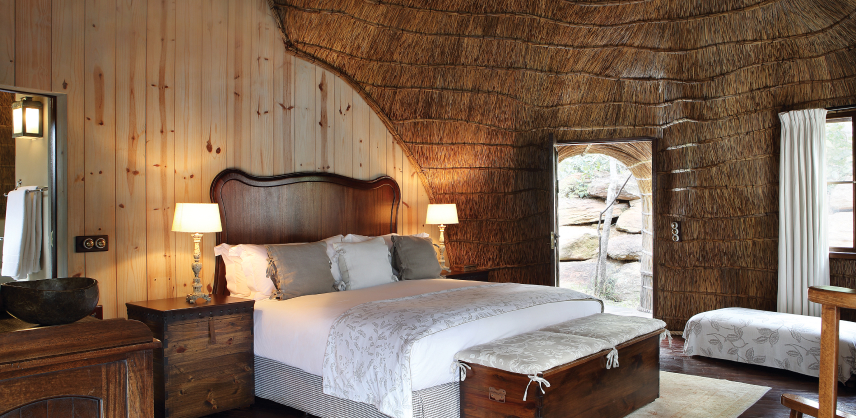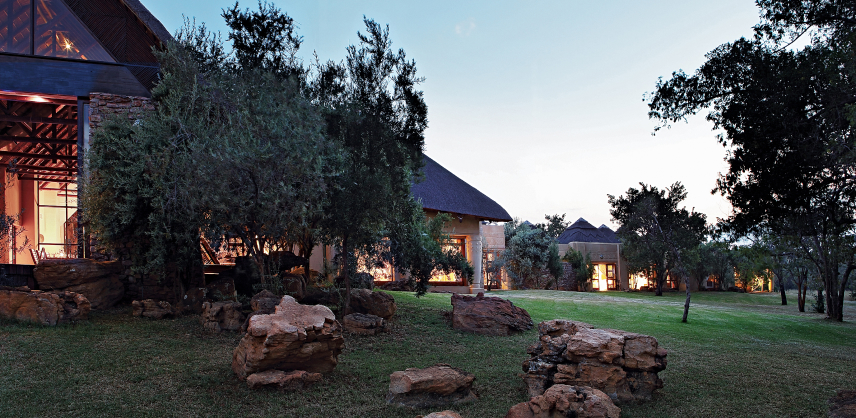Book directly with ease.
They were on an early morning stroll, casually walking across the road into the bush amongst the rocks. A gaping morning yawn inspired a quick sit down for observation and to gather their thoughts. After a brief social moment of grooming each other, the brothers lethargically got on their feet again. These two Cheetahs had quite a restful evening and were now on the prowl to find some breakfast. Scent marking the bushes as they go, they make their way to an open area where the Wild Seringa trees are standing tall in the open field. We were quite lucky to spot these two cats on our morning Safari in the Savannah. We made our way around a bend in an attempt to keep up with the fast moving felines. As we went around the corner, to our surprise, we noticed the cheetahs were looking up a tree, as if they were to climb it. This would be quite interesting, as it is unusual to see a Cheetah in a tree, never mind climbing it. These cats are not adapted like Leopards to climb trees effectively, instead they are more suited for open plains where they use speeds of up to 114 km/h to catch their prey and evade other competitive predators. Leopards, though similar in appearance, are stockier in build with no tear markings under the eyes, and are adapted with strong gripping claws and body strength to be able to climb a tree without hesitation in order to hide their kills from other predators. Leopards are nocturnal, and also predominantly use stealth to catch prey instead of speed. To our astonishment the more slender cheetah, with their beautiful tear markings running down from the eyes, quite quickly mounted the tree they were looking at. However, they appeared to be rather uncomfortable in the position and couldn't stay there for long. Cheetahs are diurnal and have got different intentions when climbing, they will only do so when the tree is at an angle for them to be able to mount it and use it as a vantage point. They cannot mount it from a vertical position like Leopards do. The reason being that cheetahs walk with their claws extracted to have good grip on the ground when running at a fast pace. The claws being extracted would have similar effect to that of a soccer player's togs. This prevents them from having grip when climbing. We watched in awe as they gained a vantage point in the Wild Seringa tree to look out for any threats or prey they can see in the distance. They looked so royal as they stood with their heads upright looking out on the plains and their beautifully camouflaged bodies blending in with the background. It appeared as if they may have spotted something from their lookout point, as they hurriedly and quite awkwardly disembarked from the thick branches of the tree. We continued down the road to follow them. They crossed in front of us and immediately assumed stalking positions. Walking right next to each other they appear as one unit. Their movement was slow and very well timed. We could not yet see what they had set their sights on, and so we slowly rolled forward to try and get a better view on what that was. Behind the trees in the distance we could see some Zebra grazing. This must be what the brothers had set their gaze upon. Their brilliant vision and the extreme benefit of a vantage point allowed them to sight the Zebra from afar and they made their way ever closer, gaining ground at a quiet pace. The striped horse-like herbivores were completely unaware of any activity and continued munching the grass. It is quite unusual to see Cheetah sizing up prey that is substantially larger than what they are, as this could result in injury for the cats if they are unsuccessful. Nevertheless, the brothers continued stalking and started getting quite close. They had made incredible ground just through a game of patience that we had to endure. We had now been watching them silently for around 40 minutes as they went from 70 metres from the Zebra to a mere 20 metres without drawing any attention to their intention. As they started licking their lips at a possible prospect of breakfast, we realised that the cheetah had a bit of a dilemma. With their extracted claws they were making more sound when moving through the bush. This ultimately resulted in the Zebra detecting the movement amongst the grass. They stood dead still, not moving a muscle. The only movement was their tails wagging about as they contemplated whether or not to run. Equally the Cheetah were also frozen in their steps, with the Zebra looking straight in their direction they weren't sure if they were identified or not so they kept still in the grass. It was a standoff. Both species not budging for a good 20 minutes. One Zebra then decided to turn its head, and with that the brothers gave a gentle step forward. The other striped members quickly noticed the sound and spotted the two cats. Suddenly there was grunting and snorting as the Zebras realised what was happening. They immediately ran off, galloping in various directions. The Cheetah's reactions were quite slow in response, as they were not in a prime position to launch their attack yet. They now had to accept the fact that their breakfast just escaped. They were not willing to exert energy with the Zebras now having the upper hand, not to mention the risk factor of them getting injured in the pursuit. They slowly moved off, and lazily disappeared into the long grass. We were flabbergasted to have experienced the thrill of the stalk. Lost for words, we returned to the lodge for a sumptuous breakfast that hopefully wouldn't escape. It was an absolutely satisfying way to start the day. Ranger Sean Jones Shambala Private Game Reserve



